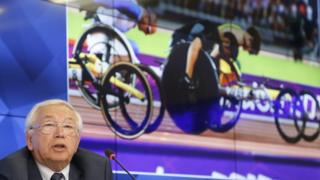 Image copyright
Image copyright
EPA
The Russian Paralympic Committee is considering whether to appeal against its ban
The International Paralympic Committee (IPC) gives details of anti-doping activities in its annual reports.
The report for 2015 is due out in the next few weeks, so the most recent report we have is the 2014 one.
In the year covered by that report, 1,013 tests were conducted for IPC sports (which include athletics, swimming, powerlifting and skiing) in which prohibited substances were found nine times.
During the year, sanctions were taken against 11 athletes.
If you break that down into the sports involved it is clear that most of the IPC’s anti-doping problems come from the sport of powerlifting, which was the source of seven of the positive tests and eight of the sanctions.
The IPC announced in 2014 that it had suspended 13 powerlifters in the previous 14 months. The sport has been targeted with a “Raise the Bar – Say No! to Doping” campaign.
Since then, the IPC has also adopted a new anti-doping code, which came into effect on 1 January 2015.
Paralympic athletes have the same list of banned substances as Olympic athletes and, like them, anyone who requires additional medication for pain or treatment must apply for an exemption.
“It’s a common misconception that a lot of Paralympians will be on prescription drugs. That’s not the case at all,” Nicole Sapstead, UK Anti-Doping chief executive, told the BBC ahead of London 2012.
“Obviously there are athletes with spinal injuries and they need pain relief. But mostly it is the same as the Olympics – things like asthma and diabetes.”
Only one athlete was given a doping sanction at the Sochi Paralympic Winter Games in 2014, but since then the McLaren Report for the World Anti-Doping Agency (WADA) found that Russia’s sports ministry manipulated urine samples provided by its athletes between 2011 and 2015.
The report identified 27 samples relating to eight Para-sports, five of which are summer sports, including some governed by the IPC.
The IPC also found evidence that samples were swapped during the Sochi Winter Paralympics, adding that it planned to reanalyse every Russian sample given at the event.
So now the Russian team has been banned from this year’s Paralympic Games in Rio, and the IPC is wondering if it has more of a doping problem than it previously thought.



